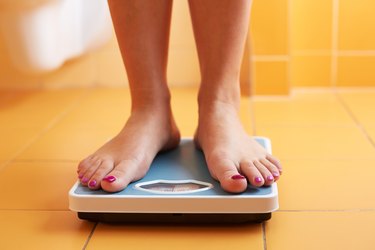
Maybe you've got a beach vacation coming up this month (hello, swimsuit!), or there's a special occasion on the horizon and you want to look your best. So you turn to Google and query: "How much weight can I lose in three weeks?"
The answer? Unless your health is at risk, it's not safe or advisable to lose more than about 6 pounds in that timeframe.
Video of the Day
Video of the Day
If you were hoping that number would be higher, keep this in mind: "The body gets used to being a certain weight and wants to maintain that, even if it's an unhealthy number," Wesley Delbridge, RDN, registered dietician and spokesperson for the Academy of Nutrition and Dietetics, tells LIVESTRONG.com.
Rapid weight loss confuses the body and can slow down the metabolism, which can in turn lead to weight gain, he adds.
Take a healthier approach by setting a modest weight-loss goal and creating good habits that will help you drop pounds safely — and keep them off.
Tip
Aim to lose between 1 to 2 pounds a week. A faster rate may decrease your amount of fat-burning muscle, which can sabotage your efforts in the long run.
Keep Your Goals Reachable
The Centers for Disease Control and Prevention and the National Heart, Lung, and Blood Institute suggest that a weekly weight-loss goal of 1 to 2 pounds is ideal. If you're able to successfully lose weight at this rate, expect to lose between 3 and 6 pounds over the course of three weeks.
Keep in mind, however, that weight loss varies widely from person to person. "If you see any amount of weight loss, then you are on track, even if it's not always 1 to 2 pounds a week," says Delbridge.
Rate of weight loss is typically based on how long someone has had overweight, their hormones and their sodium intake. "The key is to not give up — but if you're not seeing any results, then you may need to adjust your diet."
Track Your Calories
The key to losing weight is to create a calorie deficit, which is the result of consuming fewer calories than you burn. If you can keep your body in a deficit over the entire three weeks, you'll successfully shed pounds.
One pound of fat consists of about 3,500 calories, per the Mayo Clinic. If you plan to lose 1 pound per week, then, you'll need to burn an excess of 3,500 calories over seven days, or an average of 500 extra calories per day. To lose 2 pounds per week, you'll need to increase your daily calorie deficit to 1,000 calories.
Break a Sweat
Adjusting your diet is one way to create a calorie deficit, but increasing your exercise is also important. The specific exercises you add to your workout routine will depend partly on what you enjoy and find convenient, but your workout should ideally include both cardio exercises and strength training.
Read more: How to Find the Best At-Home Workouts for You
Examples of cardio include swimming, running and aerobics, while strength-training exercises include weight-training and body-weight exercises, such as yoga or Pilates.
Your weekly weight-loss workout plan should ideally include at least a pair of strength-training sessions and at least 150 minutes of cardio, which is in line with the Physical Activity Guidelines for Americans set by the U.S. Department of Health and Human Services.
Embrace Small Changes
Even if you increase the amount that you exercise, you'll significantly improve your chance of shedding a few pounds if you make helpful changes to your diet, according to the American Council on Exercise.
Start with a few simple tweaks that can make a big difference:
- Swap sugary sodas and juice for water or seltzer.
- Cut back on alcohol, which contains only empty calories and may tempt you to snack more as you drink.
- Nix processed foods, like potato chips, in favor of whole foods, like fruits and veggies.
And aim for three balanced meals each day, along with one or two snacks. "Each meal and snack should include carbohydrates, protein and fat to help the body absorb energy slowly without spiking blood sugar," says Delbridge.
Finally, have patience with the process, and keep this nugget of wisdom from Delbridge in mind: "Weight loss is a marathon, not a sprint."
- Centers for Disease Control and Prevention: "Losing Weight"
- National Heart, Lung, and Blood Institute: "Aim for a Healthy Weight: Key Recommendations"
- Centers for Disease Control and Prevention: "How Much Physical Activity Do Adults Need?"
- American Council on Exercise: "Weight Loss: Diet vs. Exercise"
- Harvard T.H. Chan School of Public Health: "Healthy Weight"
- Mayo Clinic: "Counting calories: Get back to weight-loss basics"
- Centers for Disease Control and Prevention: Balancing Calories
Was this article helpful?
150 Characters Max
0/150
Thank you for sharing!
Thank you for your feedback!